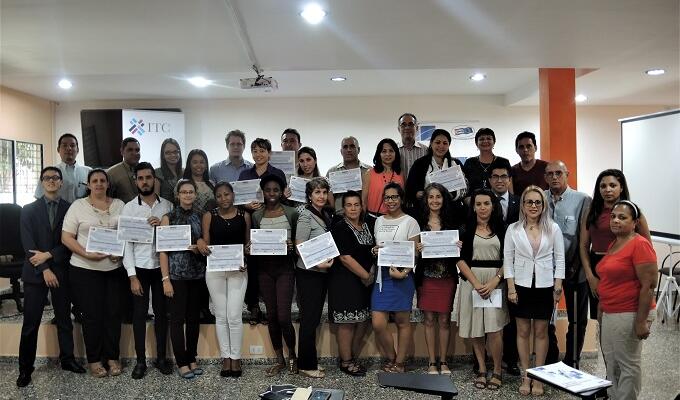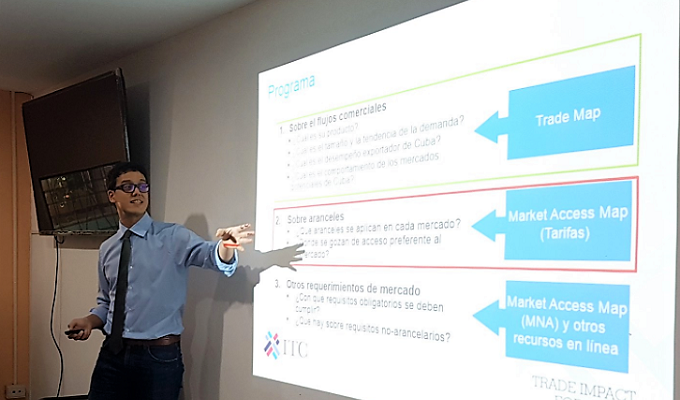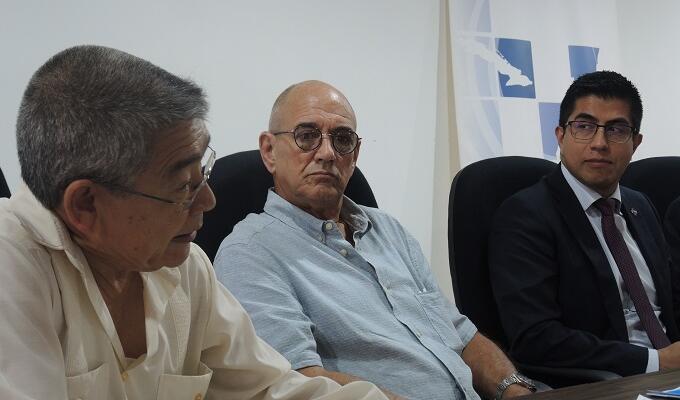


Enhancing analytical skills to identify Cuba’s export opportunities (en)
A five-day workshop by the International Trade Centre (ITC) in Havana has enabled Cuban agri-business and government representatives better to identify international market opportunities.
The 5-9 February workshop, part of the European Union-funded “Programa de Intercambio de Expertos Cuba-UE” (Cuba-.EU expert exchange programme), strengthened local business community awareness on international trade data analysis, and equipped them to independently conduct research using ITC market analysis tools and methods. ITC worked with the International and Ibero-American Foundation for Administration and Public Policies (FIIAPP), a member of Cooperación Española, the Spanish government cooperation agency, to deliver the workshop.
The workshop brought together 24 participants from Cuban government institutions such as the trade ministry, trade and investment promotion agency ProCuba, the Cuban Chamber of Commerce and goods and services sector companies. A key objective of the workshop was to teach participants to use ITC’s Market Analysis Tools to understand demand trends and potential sources of competition in promising export markets.
Two ITC officials, Yared Befecadu and Martin López, introduced participants to Trade Map and Market Access Map, ITC tools that provide statistics, market trend indicators, and tariff and regulatory data for 220 economies. Together, they examined a range of market entry factors, such as demand, seasonality, competition, prices and market segmentation.
According to Yanet Sanabria Aguila, a commercial management specialist at Cubanita, a local agro-industrial company, understanding market trends help businesses maximize revenues by timing their exports optimally. ‘In the business of exporting fresh fruits, every country presents production peaks at certain moments of the year, and this tells us when our competitors are present in our target markets,’ she said. ‘We can use ITC’s Market Analysis Tools and monthly data to understand in which period of the year our competitors are supplying each of those markets and how they are performing. We can determine the right moment to present ourselves as potential suppliers and make well-informed offers to meet the unsatisfied demand’.
Besides introducing participants to ITC’s trade databases and structured desk-based research approaches, the workshop adapted ITC’s export potential methodology to identify unrealized export opportunities for Cuba. For instance, Canada, with its 0% tariff and a higher than average market price, was identified as a promising export market for natural honey, which Cuba currently exports to Germany and France. The analysis also showed that Cuba had scope to start exporting vitamins and natural concentrates to Spain. Another market identified was Saudi Arabia, where sustained demand for wood charcoal could be met by Cuban exporters throughout the year.
ITC’s cutting edge analytical tools applied also to particular cases raised by participants in need of information on trade flows. For instance, Alegna Lombillo, a market analyst at ProCuba, previously lacked the data necessary to analyse opportunities for trade between Cuba and Trinidad and Tobago. Based on long-term supply and demand growth assumptions and a solid econometric model, ITC’s export potential methodology now allow her to do so; she was able to spot untapped potential for traditional exports such as cane sugar.
Cuba’s educated workforce means that the country is relatively well-placed to export services. Indeed, services export revenues are already outpacing those from agriculture and manufacturing. Desoft, the country’s largest software development company, already exports to Costa Rica, Peru and Spain. Mr. Ariel Hernández, vice-director of the 2000-employee company, wants to further expand Desoft’s exports, but is running into intellectual property and certification challenges. ‘Our main challenges are related to the knowledge of software licenses and certifications needed to sell our services at fair prices in EU markets’, he said.
At the end of the workshop, Alfredo Jam Massó, an advisor at the Cuban Ministry of Economy and Planning, and Roberto Verrier Castro, the director of ProCuba, affirmed that the training had bolstered the country’s capacity to conduct trade analysis. They expressed interest in a ‘training of trainers’ programme that would prepare a cadre of local experts to subsequently teach Cuban officials and companies beyond the capital to use ITC’s Market Analysis Tools, thereby enhancing national capacity and autonomy trade analysis. Other priorities mentioned included training related to services trade and the development of an academic curriculum on international trade, potentially in collaboration with local universities.



